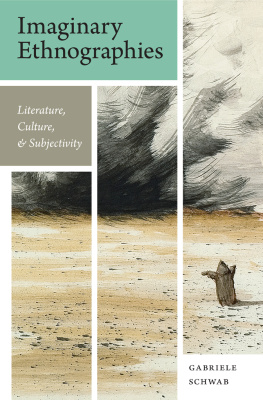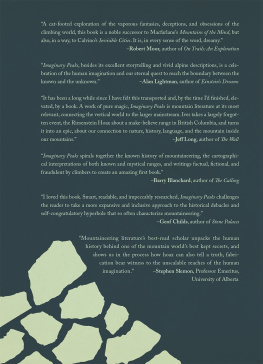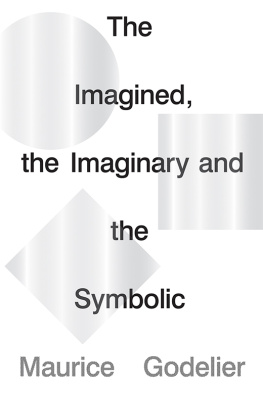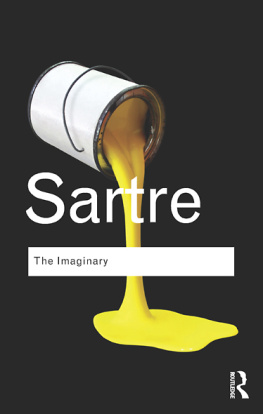imaginary ethnographies
IMAGINARY ETHN OGRAPHIES
Literature, Culture, and Subjectivity
GABRIELE SCHWAB
COLUMBIA UNIVERSITY PRESS New York

COLUMBIA UNIVERSITY PRESS
Publishers Since 1893
NEW YORK CHICHESTER, WEST SUSSEX
cup.columbia.edu
All rights reserved
ISBN 978-0-231-53080-4 (ebook)
Library of Congress Cataloging-in-Publication Data
Schwab, Gabriele.
Imaginary ethnographies : literature, culture, and subjectivity / Gabriele Schwab.
p. cm.
Includes bibliographical references and index.
ISBN 978-0-231-15948-7 (cloth : acid-free paper)ISBN 978-0-231-15949-4 (pbk. : acid-free paper) 1. LiteratureHistory and criticismTheory, etc. 2. Literature and society. 3. Social science literature. I. Title.
PN51.S3196 2012
809.93358dc23
2012017415
A Columbia University Press E-book.
CUP would be pleased to hear about your reading experience with this e-book at .
Cover Image: Brion Gysin, untitled, courtesy of Galerie de France
References to Internet Web sites (URLs) were accurate at the time of writing. Neither the author nor Columbia University Press is responsible for URLs that may have expired or changed since the manuscript was prepared.
To my sons, Manuel and Leon
Contents
Imaginary Ethnographies has evolved like a mutant creature moving slowly toward an ever-changing future. Initially I conceived the book as a sequel to The Mirror and the Killer-Queen, where I first developed a theory that looked at reading as a form of cultural contact. In one of the chapters, titled Haunting Legacies, I wanted to include an auto-ethnographic reflection, analyzing the transgenerational transmission of violent histories with a focus on my own history of growing up in Germany in the wake of World War II. Soon it became clear, however, that this topic could not be handled in a single chapter but required an entire book. For several years I worked on both projects simultaneously, and during that time published several chapters of Imaginary Ethnographies in essay form. Eventually Haunting Legacies took over and demanded to be completed first. Once I returned to the more encompassing Imaginary Ethnographies, its organization into two discrete sections and a coda suggested itself almost naturally. I had written an essay on Lvi-Strauss, Derrida, and the Nambikwara that provided a productive opening for the book since it dealt directly with ethnography, writing, and aesthetics. I then added two chapters on literature, culture, and ethnography, one on traveling literature, and the other on exoticism and the vicissitudes of cultural transference. The second section of Imaginary Ethnographies focuses on close readings organized around iconic cultural figures, namely the cannibal, the child, and the alien, followed by a coda on the posthuman.
Different institutions supported Imaginary Ethnographies during its various stages, and colleagues and studentstoo many to name individuallycontributed in myriad ways and with remarkable engagement and generosity to the development of the project into a book. Over the years I taught several graduate seminars on Imaginary Ethnographies, not only at the University of California, Irvine (UCI), but also in Munich, Santiago de Compostela, and at Rutgers University. My deepest gratitude goes to the students in those seminars, whose involving, imaginative, and sophisticated discussions helped me in shaping the final version of Imaginary Ethnographies. First and foremost, my heartfelt thanks go to my research assistants: Clara McLean is one of the most careful and skilled editors I have ever met, and Travis Tanner, one of my most attuned readers, put the greatest care into preparing the initial manuscript for the press. I owe them a million thanks. It was most fortuitous that Shambhavi Prakash was assigned to me as my research assistant during my semester at Rutgers. We share an interest in the relationship between literature and ethnography, and I thank her for the many unforgettable discussions, not to mention helping me survive the practical challenges of teaching in a new place. Philip Anselmo, my research assistant during the final editing, helped me immensely not only with his feedback but also with saving me precious time by making me more computer literate.
Special thanks go to the numerous institutions and colleagues who hosted lectures at their home universities. Over the years I have presented more than thirty lectures on Imaginary Ethnographies in the United States, Germany, Australia, Bulgaria, China, England, Canada, Israel, and New Zealand. Introducing the project, or specific chapters, in these places kept the momentum going, even during the times I had to put the book on hold because of other obligations. A few instances were seminal for the current shape of the book: I am indebted to Mihai Spariosu for inviting me to teach a summer seminar on Imaginary Ethnographies at the School for Theory and Criticism in Santiago de Compostela, where I had superb discussions with students and colleagues from different parts of the world, many of whom I am still in touch with. They helped me tremendously in getting the project launched. During the summer in Santiago, I discussed initial ideas about the project with my friend and mentor, Wolfgang Iser, and his wife, Lore. While they were both somewhat shocked about the fact that I seriously considered including a chapter on science fiction and the figure of the alien, our friendship and collegiality survived as we shifted our discussions to what they considered to be more serious aspects of my research. I will always be grateful to Wolfgang for supporting my work even when, rather than merely following in his footsteps, I deliberately chose a different path. At Santiago de Compostela, I met Dimitar Kambourov, who later came to work with me at UCI, hosted various lectures of mine in Bulgaria, and became a translator of my work. I also met Iping Liang and Hanping Chiu at Santiago de Compostela, both colleagues from Taiwan, who were unbelievably generous and intellectually stimulating hosts when I lectured in Taipei on Imaginary Ethnographies. Murat Eyuboglu came to Santiago with a dissertation project on music, using the theory I had developed in Subjects without Selves. He became so involved with our discussions on the Nambikwara that he began a collaboration with Marcelo Fortaleza Flores on a most interesting ethnographic film titled Claude Lvi-Strauss: Return to the Amazon (2009). I thank Dimitar, Iping, Hanping and Murat for their loyal friendship and the many creative exchanges about our common interests.
I also thank my colleagues at UCI, where I first presented my ideas on Imaginary Ethnographies at the Distinguished Faculty Lecture sponsored by the Irvine Division of the Academic Senate, and later at various conferences in the Department of Anthropology. I was truly fortunate that George Marcus joined UCI and hosted a series of exciting events about experimental ethnographies at the Center for Ethnography. He, together with Michael Fischer and James Clifford, originally inspired my project in its earliest stages during the writing culture debates. I thank George and Michael for their wonderful support and feedback over the years.
My colleagues at the University of Constance invited me on various occasions to present from my project. Special thanks go to Aleida Assmann and Renate Lachmann, whose continued support keeps my ties with my alma mater alive. I am grateful to Florian Sedlmeier for our inspiring discussions at Irvine and for his invitation to present Imaginary Ethnographies at the Graduiertenkolleg in Constance. Ross Morris couldnt have known what a special gift she offered me with her invitation to lecture on
Next page
















